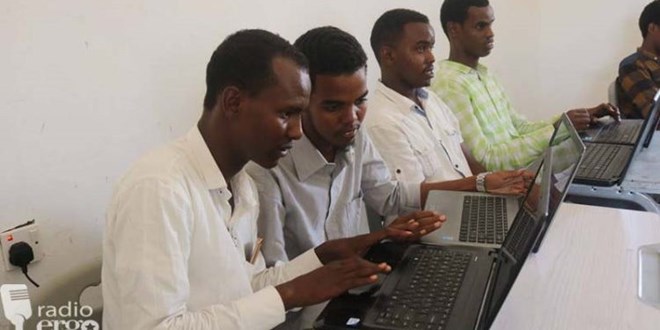
Wednesday May 25, 2022

(ERGO) – Puntland law graduate Fartun Abdirahman Adan, 28,
managed to transform disappointment at not landing a job straight out of
university into success in the growing field of online learning.
Tired of waiting for employment, Fartun, who graduated from
Bossaso university in 2018, took a course in teaching skills from a free online
school and a year later set up her own online school, Al Najaax Online
Education.
“I have put a lot of effort into this school and it has
become a financial breakthrough for me,” Fartun declared. “I wanted to share my
knowledge with the world, and also be in a position to help my family
financially and support myself too.”
Al Najaax currently has 100 students, in and outside
Somalia, taking courses in subjects such as Arabic, English, mathematics, and
parenting skills. Student fees are five dollars a month.
Fartun has shouldered responsibilities for her family of
nine, paying $100 rent for their two-bedroom house, and monthly school fees of
$15 for each of her siblings at Alwaaha secondary and Darawish primary school.
Her father, a school teacher in Bossaso, took early
retirement due to sickness. Fartun has been able to step in as primary income
earner.
Al Najaax uses social media platforms like YouTube, Facebook
and Instagram to market its courses and to enroll students. Course work and
assignments are shared in video or audio through WhatsApp groups and Telegram.
Fartun says online learning has many advantages in Somalia
over face-to-face learning.
“The teacher has a chance to teach large numbers of students
and the students don’t need bus fare to attend a class. Another crucial benefit
is about safety and security: you are in your own room, so if people fight in
the street or not there is no disruption to your studies and classes run
smoothly. Even mothers with small children can benefit from this mode of
education.”
Another graduate who turned to online skills development is
Farah Abdikadir Mohamed, 24, who graduated from Puntland university school of
technology in 2017. He was unable to find a job with his degree. He signed on
for a year’s online course in video design and editing. He is now making a
living from video production, charging Somali and overseas clients $50-$60 per
video.
“I believe a lot has changed in my life. Now I am a skilled
person who understands the real needs of the market. I have added a lot of
values to my life, both financially and in terms of skills. I’m certain that
today people need my services,” said Farah.